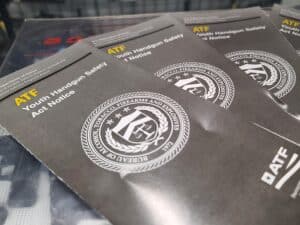A portion of the ATF’s recent rules targeting unfinished gun parts is invalid because it did not go far enough, according to a federal judge.
On Monday, US District Judge Edward Chen sided with the gun-control group Giffords and the state of California. He found that the ATF’s frames and receivers rule is “arbitrary and capricious” to the extent it exempts unfinished and unserialized AR-15 lowers, labeled “ghost guns” by opponents, sold on their own from further regulation. He specifically found the ATF didn’t consider how quickly an unfinished frame could be finished with commonly available tools.
“The Court agrees with Plaintiffs that ATF’s actions related to Example 4 are arbitrary and capricious in failing to take into account all eight factors related to the ‘readily’ assessment (in particular, time) and in failing to address the impact of easy availability of, e.g., jigs and tools from sources other than the seller or distributor of the incomplete receiver,” Judge Chen, a Barack Obama appointee, wrote in California v. ATF.
The ruling notches a win for gun-control advocates in their push to expand federal regulations on homemade firearms and unfinished gun parts. In the immediate term, the ruling will force the ATF to reconsider how readily unfinished AR-15 receivers can be converted into completed firearms for the purposes of federal law unless the agency appeals.
A spokesperson for the Department of Justice declined to comment on whether it plans to appeal.
The decision also adds further uncertainty over the future of the ATF’s rule itself. Gun-rights advocates, who have traditionally been the side challenging the rule in court, already secured a ruling from the Fifth Circuit Court of Appeals last November that held the ATF acted unlawfully when it attempted to regulate frames and receivers in the first place without an act of Congress. The Biden administration has asked the Supreme Court to overturn that decision, and the High Court has allowed the rule to remain in effect while it weighs taking the case.
Unlike gun-rights plaintiffs who have argued that the ATF went too far in regulating unfinished firearms, California and Giffords argued that the agency did not go far enough. They supported the rule for targeting homemade gun kits but claimed that the ATF improperly allowed standalone “80% receivers” to remain legal in “Example 4” of its final rule.
“A billet or blank of an AR-15 variant receiver without critical interior areas having been indexed, machined, or formed that is not sold, distributed, or possessed with instructions, jigs, templates, equipment, or tools such that it may readily be completed is not a receiver,” Example 4 of the ATF’s final rule reads.
Judge Chen said the plaintiffs’ complaints had merit with respect to how the ATF determined how “readily” a frame or receiver could be converted into a completed firearm—a threshold for deciding which unfinished parts should be regulated as though they were finished.
“The ATF his simply disregarded the ease by which tools/jigs are available (from whatever source) which would render a receiver blank ‘readily convertible’ to a completed receiver,” he wrote.
“The Court therefore: (1) declares one subsection of the final rule (Example 4) and related agency actions to be unlawful and enjoins Defendants from enforcing them; (2) vacates one subsection of the final rule (Example 4) and related agency actions; and (3) remands to ATF for further proceedings consistent with the Court’s opinion,” he added.
David Pucino, Giffords’ legal director, called the ruling “a big win for public safety.”
“ATF took an important step last year to stem the flow of untraceable ghost guns,” he said in a statement. “However, critical loopholes still exist in ATF’s current rule. We brought this lawsuit to close those dangerous loopholes that left AR-platform ghost guns on the market, and we applaud the court’s decision ordering ATF to address them.”






